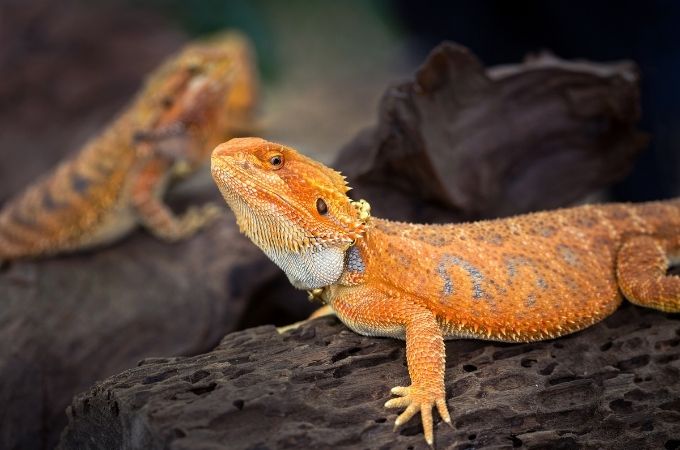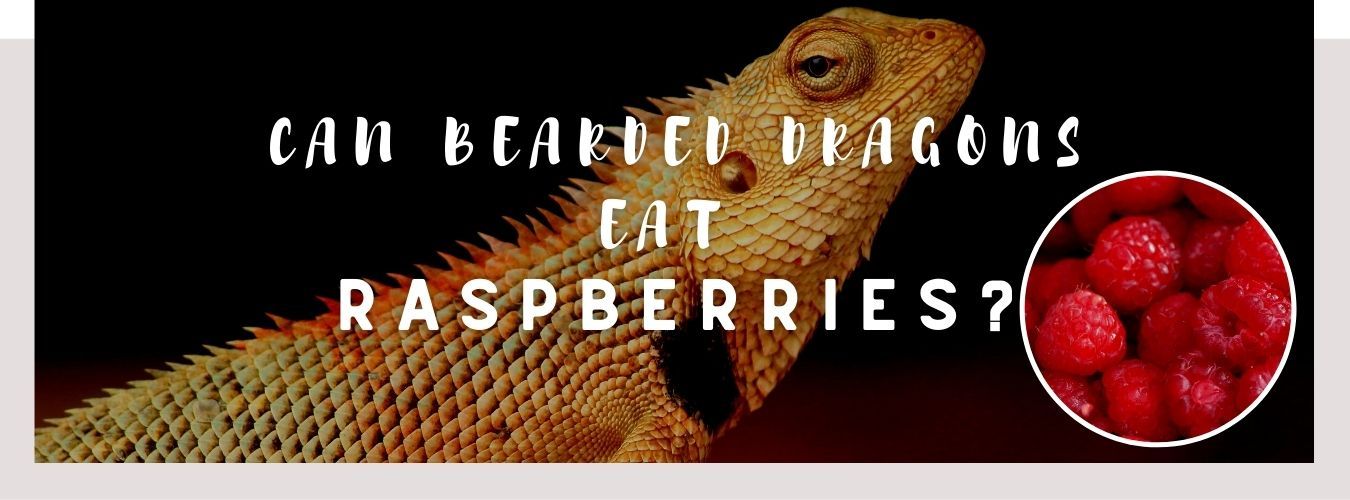
The Juicy Facts About Bearded Dragons And Raspberries
With their sweet and tart taste, juicy raspberries have long been a favorite by themselves or in smoothies, jams, desserts. Can bearded dragons eat raspberries?
The short answer is, yes. Bearded dragons can safely consume two to three raspberries every few weeks, as a treat.
This article will explore the benefits and risks of bearded dragons eating raspberries.
Nutritional Profile Of Raspberries
Nutrients of 100 grams fresh and raw raspberries
| Nutrient Name | Amount |
| Water | 85.8 g |
| Energy | 52 kcal |
| Protein | 1.2 g |
| Calcium | 25 mg |
| Phosphorus | 29 mg |
| Sugars | 4.42 g |
| Dietary Fiber | 6.5 g |
| Vitamin C | 26.2 mg |
| Vitamin A | 2 ug |
| Vitamin E | 0.87 mg |
| Copper | 0.09 mg |
| Magnesium | 22 mg |
| Niacin | 0.6 mg |
| Pantothenic acid | 0.33 mg |
| Lutein + zeaxanthin | 136 ugs |
| Ca:P ratio | 1:1.2 |
Raspberries contain fiber, calcium and vitamin C. which have significant benefits for your bearded dragon’s health.
Health Benefits Of Feeding Raspberries To Bearded Dragons

Key vitamins and minerals offered by raspberries include
- Carbohydrates, which provide energy
- Fiber, which promotes smooth digestion
- Vitamin C, which is vital for growth, a healthy immune system, vision, reproduction, and organ and tissue maintenance and repair
- Manganese, which aids metabolism
- Vitamin K, which regulates blood clotting and aids in bone and overall health
- Iron, which helps strengthen blood and bones and oxygenates the organs
- Magnesium, which helps maintain healthy blood sugar levels
- Vitamin E, which protects the body’s cells
- Potassium, which regulates blood pressure and nerve function
Raspberries are 87% water if your dragon needs a quick boost of hydration. Raspberries are also nutritionally dense and contain antioxidants that help prevent cell oxidation and damage caused by free radicals.
You might also like: Can Bearded Dragons Eat Pomegranate?
Risks Of feeding Raspberries To Bearded Dragons
High Sugar Content
The main problem with most fruits for bearded dragons is their relatively high sugar level.
While the sugar in raspberries is the healthier fructose variety, it can still negatively impact your beardie’s health.
Too much sugar can cause tooth decay, affect digestion, and create weight problems.
Incorrect calcium-to-phosphorus ratio
Raspberries have more phosphorus than calcium, with a calcium-to-phosphorus ratio of 1:1.2, which is not ideal because phosphorus binds with calcium and prevents absorption in the bloodstream.
The low ratio can lead to a calcium deficiency and eventually to Metabolic Bone Disease for bearded dragons, a debilitating and potentially deadly disease. It can also cause skeletal problems, renal issues, and kidney stones.
Moderately high levels of oxalates
Raspberries also contain about 48 mg of oxalates or oxalic acid per cup which is high.
Like phosphorus, oxalates are dangerous because they bind with minerals like calcium and cause mineral deficiencies.
They also create kidney stones and renal problems. Therefore, the amount of oxalic acid in your bearded dragon’s diet should always be closely monitored.
Can Baby Bearded Dragons Eat Raspberries?
Juvenile bearded dragons should not eat raspberries. Baby bearded dragons and younger dragons have a very sensitive digestive system. Most of their diet should come from feeder insects, with some appropriate leafy greens. Therefore, it is best to avoid all fruits, including raspberries, until at least twelve months of age.
How Often Can You Feed Raspberries To A Bearded Dragon?

If adult bearded dragons eat raspberries regularly, they may begin to reject other high-nutritional foods. Bearded dragons love this fruit because of its sweet flavor and velvety texture.
Raspberries are not good food for daily feeding. Since they are heavy in water and sugar, excessive water consumption can result in overhydration and diarrhea in beardies. These reptiles can thrive on a small amount of water for a few weeks. They do not need a lot of water to stay alive.
The high sugar content of raspberries is a concern for bearded dragons. Excess sugar causes obesity, tooth decay, and diarrhea.
It is crucial to make raspberries an occasional treat rather than a diet staple. Bearded dragons can eat not more than one or two raspberries every other week.
Can Bearded Dragons Eat Frozen Raspberries?
Do not give frozen raspberries to your bearded dragon. They can cause choking.
Sometimes you run out of fresh fruits. If you have no other choice, especially at this time, defrost the frozen raspberries to a normal temperature before feeding them to your dragon.
Can Bearded Dragons Safely Eat Raspberry Leaves?
Bearded dragons may consume raspberry leaves in moderation. Raspberry tree leaves operate as a mineral concentrator.
More significantly, consuming raspberry leaves helps beardies control and reduce blood sugar levels. It makes them healthy. The leaves also include a lot of bioflavonoids and antioxidants.
You might also like: Can Bearded Dragons Eat Cherry Tomatoes ?
Preparing Raspberries For Your Bearded Dragon
To develop a healthy diet for your bearded dragon, you need to know how to prepare it. Here is how.
Choose The Berry
Select ripe and fresh raspberries for your dragon.
Wash It
Wash the raspberries with clean water.
Typically, when any berry grows, there’s spraying to get rid of pests. Cleansing removes any chemicals.
Chop It
Cut the raspberries in half to make them comfortable for the bearded dragon to swallow.
Serve The Berry
Now, it’s time to let your bearded dragon enjoy its meal. Put them in a bowl as part of a salad. You can also have them eat out of your hand.
Bottom Line
Raspberries are considered a safe and healthy addition to a bearded dragon’s diet. They are rich in several vitamins and multiple minerals. They also contain dietary fiber and they are a good source of water for your lizard.
Raspberries are also quite sweet. There are more beneficial foods to give to your beardie, so they should be considered an occasional treat rather than a staple item.
Continually research new foods you wish to include in your bearded dragon’s diet. Even food that seems the healthiest can pose risks to your bearded dragon. If you are unsure, please contact your vet for advice.
I am a huge animal lover and have four dogs, a Labrador, Jack Russell, Pug, and Teacup Yorkie. I also have a cat and a Cockatiel. I have had pets since I was a toddler, and there was not a day when there wasn’t an animal in my house.
Contents
- 1 The Juicy Facts About Bearded Dragons And Raspberries
- 2 Health Benefits Of Feeding Raspberries To Bearded Dragons
- 3 Risks Of feeding Raspberries To Bearded Dragons
- 4 Can Baby Bearded Dragons Eat Raspberries?
- 5 How Often Can You Feed Raspberries To A Bearded Dragon?
- 6 Can Bearded Dragons Safely Eat Raspberry Leaves?
- 7 Preparing Raspberries For Your Bearded Dragon
- 8 Bottom Line









